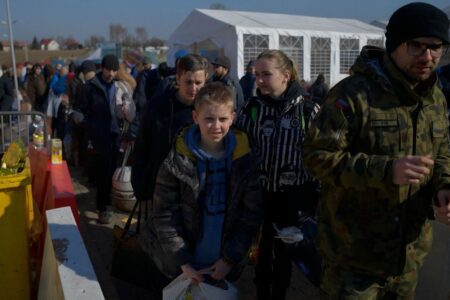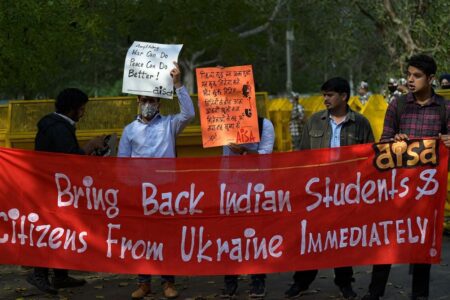
Online classes are set to begin or have recently begun for most universities in Ukraine, providing much relief for medical students who were stuck in a lurch after they were forced to abandon their studies in the face of war.
Many students who returned home after the Russia-Ukraine war broke out on Feb. 24, 2022 were uncertain when they could resume their education. The introduction of online learning has provided a degree of reassurance that they will have the opportunity to complete their courses.
Medical students told The Hindu that they were informed of the move to online learning through mail. Many are heaving a sigh of relief. “Even if it’s online, I’m happy that there is some continuity,” Raifa, an undergraduate medical student, told the publication. “My college has mailed me about online classes starting soon.”
CNBC reported that university authorities are replicating the pandemic model of online learning, in which teaching is conducted through virtual presentations, seminars, and pre-recorded videos. This comes despite the fact that some teachers are hiding out in bunkers in Ukraine or have fled to neighbouring countries for their own safety.
However, these universities are working at a reduced strength. Some teachers have joined the Ukrainian Army or are volunteering for rescue operations. Others are unable to log into their classes due to a spotty internet connection.
“Teachers are trying their best to cover the portions that have piled up because of the four weeks of holidays,” Joshina Jose, a third-year medical student at Lviv National Medical University, told The Times of India. “We are missing the practical classes. Teachers said the licensing exam (KROK–1) that was scheduled for June may be postponed because of the situation.”
The lack of a practical element has provided grief for Indian medical students in the past. Those locked out of China, in particular, have spent two years fearing for their futures as the National Medical Commission — and many other bodies in India and beyond — does not recognise or approve any medical courses conducted only through online settings.
Medical students in universities in Ukraine are concerned that a similar situation may apply to them. “Though the college has given us a time-table and teachers have promised to be available to help us with the course; practical classes are vital,’’ Vikram Katiyal told The Hindu.
 Many students were forced to flee Ukraine when the war broke out.
Many students were forced to flee Ukraine when the war broke out.
Indian medical students are weighing their options
Many students have turned to government authorities for help, seeking admission into medical colleges in their respective countries. “It’s exam time for medical universities in Ukraine in March-April,” Sidratul, a fifth-year Indian student at Odessa National Medical University, told The Hindu. “Our vacation will start in June and we will lose a year if remedial measures are not initiated before mid-April.”
Government bodies in several countries, including India and Egypt, have announced measures to allow students to complete their mandatory internships or studies locally. Universities in other countries have opened their doors to affected students as well, including those in Poland, Hungary, the UAE, and more.
However, transferring out of universities in Ukraine is proving to be a painful process. The abrupt evacuation of thousands of students has meant that many didn’t have transcripts or evidence that they had studied at a particular university while those who had already paid their fees in full are also reluctant to incur additional costs of transferring.
Due to this, many want to finish their degrees in Ukraine itself.
“We don’t want to take chances about how breaks and transfers in courses will work for us in the future,” a student who did not wish to be identified told The Hindu. “Almost all the countries have their own sets of rules when it comes to foreign nationals working as doctors there or even for those wanting to study for post-graduation. It’s best to finish the entire course from one country and one university.”
Online classes at universities in Ukraine disrupted by sirens
 Teachers still in Ukraine are conducting classes out of bunkers, which they sometimes have to abandon when the sirens sound.Classes that are conducted by lecturers and teachers still in Ukraine are accompanied by the occasional sound of coded sirens. “If the second siren goes off five seconds after the first one, the people in the region must take refuge in bunkers,” explained Jose. “If there is a siren after a long interval, it means the situation is safe.”
Teachers still in Ukraine are conducting classes out of bunkers, which they sometimes have to abandon when the sirens sound.Classes that are conducted by lecturers and teachers still in Ukraine are accompanied by the occasional sound of coded sirens. “If the second siren goes off five seconds after the first one, the people in the region must take refuge in bunkers,” explained Jose. “If there is a siren after a long interval, it means the situation is safe.”
The constant threat of danger means that teachers are forced to occasionally pause their online classes to seek out safety. Shri Ranjani, a fifth-year medical student at National Prigone Memorial Medical University, describes how an “Air Siren” is displayed if threats arise.
“The teacher may return within 30 to 60 minutes or not return at all,” she told The Times of India. “We have to attend four online classes daily. Among the 13 students in my batch, three are from Tamil Nadu. The remaining students are from North India and Egypt.
“Though the university is offering us online classes, there is no assurance about what will happen next as our teachers are attending the online sessions from bunkers. We request the authorities here to admit us into medical colleges in the country as we will not be able to go back to Ukraine in the near future.”
Anikha Merrin Thomas, a third-year student at Bogolomets National University, told The Hindu: “Though the university is offering us online classes, there is no assurance about what will happen next as our teachers are attending the online sessions from bunkers.”
Indian students studying at universities in Ukraine are also making keeping in contact with their lecturers and teachers to ensure their safety.










